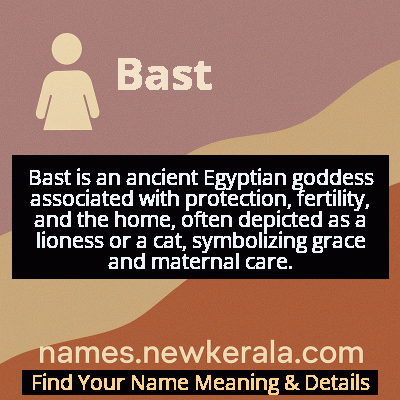Bast Name Meaning & Details
Origin, Popularity, Numerology Analysis & Name Meaning of Bast
Discover the origin, meaning, and cultural significance of the name BAST. Delve into its historical roots and explore the lasting impact it has had on communities and traditions.
Name
Bast
Gender
Female
Origin
Egyptian
Lucky Number
6
Meaning of the Name - Bast
Bast is an ancient Egyptian goddess associated with protection, fertility, and the home, often depicted as a lioness or a cat, symbolizing grace and maternal care.
Bast - Complete Numerology Analysis
Your Numerology Number
Based on Pythagorean Numerology System
Ruling Planet
Venus
Positive Nature
Harmonious, responsible, caring, and artistic.
Negative Traits
Overly idealistic, superficial, possessive, or jealous.
Lucky Colours
Pink, turquoise.
Lucky Days
Friday.
Lucky Stones
Diamond, turquoise.
Harmony Numbers
2, 3, 9.
Best Suited Professions
Artists, musicians, teachers, healthcare workers.
What People Like About You
Warmth, nurturing nature, artistic flair.
Famous People Named Bast
Bastet
Ancient Egyptian Goddess
One of the most enduring Egyptian deities, worshipped for over 3,000 years as protector of home and family
Bast the Votary
Ancient Egyptian Priestess
Documented high priestess who oversaw major temple rituals during the Late Period
Bast (Modern)
Contemporary Spiritual Leader
Leading voice in modern Egyptian pagan revival movements and Kemetic reconstructionism
Name Variations & International Equivalents
Click on blue names to explore their detailed meanings. Gray names with will be available soon.
Cultural & Historical Significance
Her cultural peak came during the Late Period (664-332 BCE) when her cult center at Bubastis became one of Egypt's most important pilgrimage sites. Greek historian Herodotus vividly described her festival as a massive celebration where participants traveled by boat to Bubastis, with women shaking sistrums and singing loudly. Archaeological evidence confirms the scale of these gatherings, with the temple complex covering significant territory. The millions of cat mummies found at her temples demonstrate both her popularity and the economic impact of her worship, as breeding cats for mummification became an industry. Her dual nature—both gentle protector and fierce defender—made her accessible to all Egyptians, from pharaohs to commoners, reflecting the complexity of divine power in Egyptian religious thought.
Extended Personality Analysis
People named Bast often embody a remarkable balance of seemingly contradictory qualities that reflect the goddess's complex nature. They typically possess a warm, radiant personality that draws others to them, much like the sun's inviting warmth. This solar connection often manifests as optimism, creativity, and the ability to illuminate solutions in difficult situations. Their protective instincts run deep—they're the friends who fiercely defend their loved ones and the family members who create sanctuaries of comfort and safety. Like cats, they value their independence and personal space, often needing quiet time to recharge away from social demands.
Their artistic sensibilities frequently emerge through music, dance, or visual arts, echoing Bast's role as patroness of celebration and joy. They have an intuitive understanding of emotional dynamics, making them excellent at reading people and situations. This emotional intelligence, combined with their natural grace, helps them navigate social complexities with apparent ease. However, their independent streak means they don't suffer fools gladly and can be quite selective about their inner circle. When threatened or when principles are violated, their more fierce lioness nature emerges—they can be formidable opponents when defending what they believe is right. This duality makes them both comforting companions and powerful allies.
Modern Usage & Popularity
The name Bast has found renewed relevance in the 21st century, particularly among parents seeking distinctive mythological names with deep cultural roots and strong feminine energy. While it remains uncommon in mainstream naming databases, it has developed a dedicated following in several niche communities. Pagan and Wiccan parents often choose Bast for its connections to feminine divinity, protection magic, and nature symbolism. The name appeals to cat lovers and those drawn to Egyptian history and mythology. Its usage has been significantly boosted by popular culture appearances in Neil Gaiman's 'American Gods' and Rick Riordan's 'The Kane Chronicles,' introducing the name to broader audiences. The trend toward shorter, punchier names has also worked in Bast's favor, as its single syllable makes it memorable and easy to pronounce internationally. Modern bearers often appreciate the name's combination of ancient heritage and contemporary relevance, representing both cultural preservation and progressive values of female empowerment and environmental consciousness.
Symbolic & Spiritual Meanings
Bast embodies rich symbolic meanings that span physical, emotional, and spiritual dimensions. As a solar deity, she represents the essential life-giving warmth that enables growth and fertility—both in nature and human endeavor. Her transformation from lioness to cat symbolizes the civilized channeling of raw power into protective, nurturing energy. The cat symbolism connects her to mystery, intuition, and independence, while maintaining the capacity for fierce defense when necessary. She represents the sacred domestic sphere—the home as sanctuary and the family as the fundamental social unit worthy of protection. Her association with ointment jars links her to healing and preservation, while her connection to music and dance symbolizes joy, celebration, and the artistic expression of the human spirit. In modern interpretation, Bast has become symbolic of balanced feminine power—strong yet gentle, independent yet community-oriented, ancient yet eternally relevant. Environmentalists see in her a symbol of human-animal connection and ecological balance, while feminists appreciate her evolution from warrior to protector as representing the complexity of female strength.

